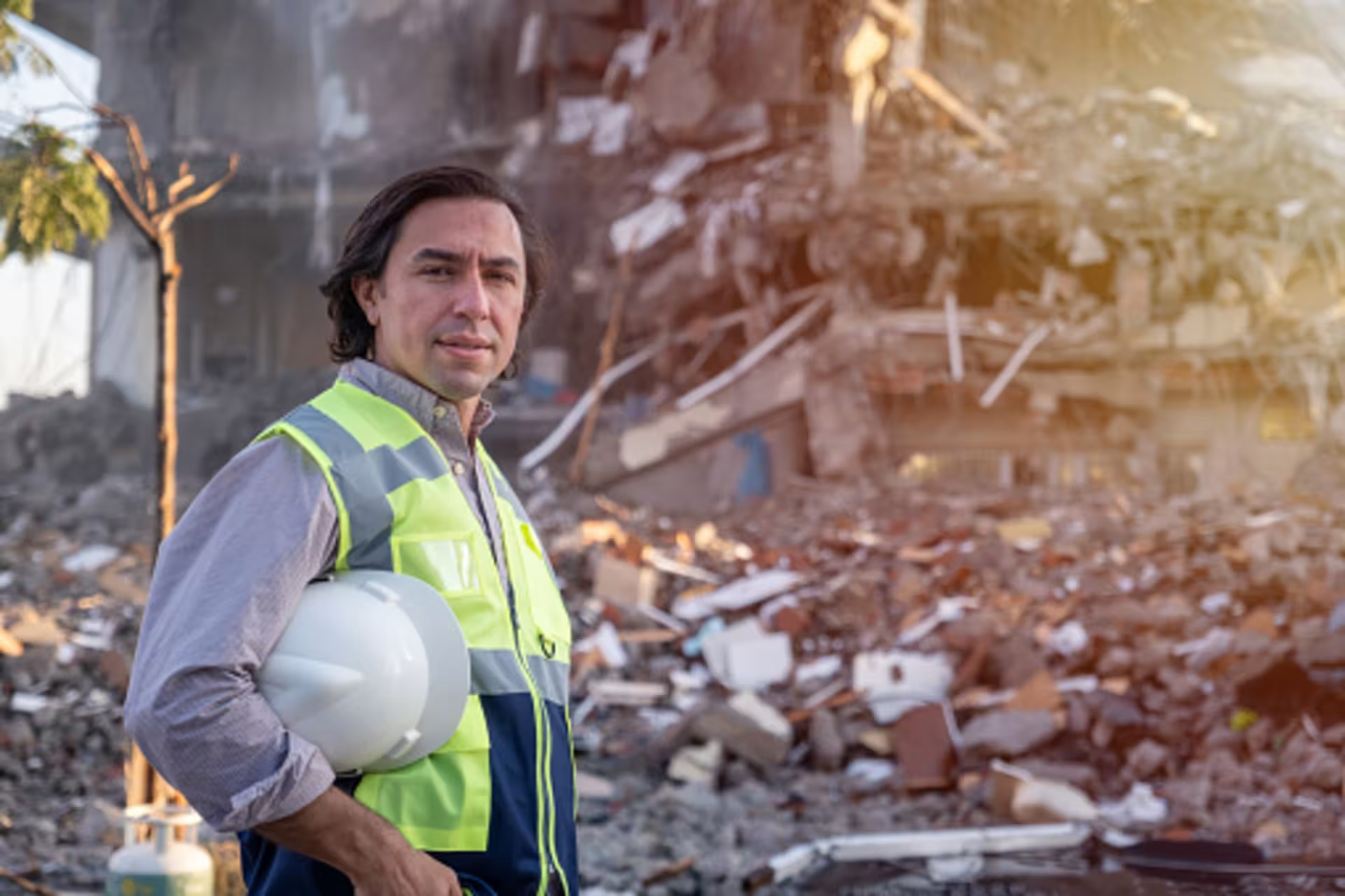Read time 8 minutes
Published on Nov 16, 2022
If you’re on the lookout for a career that would enable you to truly make a difference in your community, you might consider exploring emergency management careers. Careers in emergency management are crucial for the continued functioning of society both during and in the aftermath of a large-scale disaster, such as a flood, wildfire or mass shooting. This type of career might be the right fit for you if you tend to stay calm under pressure, are able to think well on your feet and have an enduring desire to help others in your community.
What Are Careers in Emergency Management?
Natural disasters have affected our planet for billions of years. Yet, in recent times, natural disasters such as hurricanes, floods and heat waves have become significantly more frequent and severe due to climate change. Of 77 documented weather-related disasters from 2015 to 2017, 62 have been scientifically linked to human-driven climate change, indicating that the trend of increasingly severe disasters is likely to continue.(See disclaimer 1)
Emergency management professionals are charged with planning for large-scale disasters and leading the response efforts. These specialists also plan for, and respond to, man-made disasters such as mass shootings as well as acts of domestic or international terrorism. In the case of man-made disasters, prevention is another core component of the mission of emergency management professionals.
Emergency management professionals can work across a wide range of settings. Many of them work for local, state and federal government agencies. Others prepare emergency response plans for private companies, hospitals or universities, which may implement their own response plans in the event of a major disaster. (For instance, hospitals need to know how to respond to a prolonged power outage that threatens their capability to provide care.)
Types of Emergency Management Careers
Careers in emergency management can be defined narrowly (e.g., referring only to individuals who plan for and respond to large-scale disasters), but they can also encompass other types of first responders, ranging from emergency medical technicians (EMTs) to police officers to firefighters. They can also include homeland security agents and similar federal officials, especially considering that these professionals often work to prevent and respond to acts of terror.
The following are some examples of common types of emergency management careers that you might consider pursuing.
Emergency Management Planner
An emergency management planner may also be called an “emergency management assistant.” This is typically an entry-level position that involves developing emergency operations plans. These professionals usually work under the direction and supervision of the emergency management specialist and director.
Emergency Management Specialist
After gaining several years of experience in an entry-level role, you may qualify to pursue a mid-level position, such as that of emergency management specialist. As a specialist, you may have somewhat more autonomy, depending on your employer. You would likely be responsible for advising the director or coordinator, liaising with others in related departments/agencies and developing plans, such as hurricane evacuation plans and hazardous material response plans.
Emergency Management Director
The emergency management director (sometimes called the “emergency management coordinator”) is typically the top leader in the department. They are responsible for overseeing and directing all of the activities of the emergency management specialists and planners. The director often liaises with other top officials, such as the police chief, budget director, fire chief, mayor and director of public works.
Depending on the specific work environment, the director may also be involved with writing emergency response plans, or they may primarily review the work of planners. Other tasks can include the following:
Communication and coordination are critical functions for an emergency management director. A director must routinely meet with community groups as well as school and hospital officials to discuss response plans and explore the need for training programs. In the event of an emergency, directors may appear on TV during press conferences to keep the public apprised of what is happening, where the evacuation routes are and how the public can access needed resources.
The job of an emergency management director is not an entry-level one. It requires a strong academic background and many years of experience in the field.
Business Continuity Managers
The job of a business continuity manager is similar to that of an emergency management director. However, a business continuity manager works for a hospital, university, private company or similar organization.
These professionals perform work that is similar to the tasks of an emergency management director. However, they also focus on assessing how their organization might be affected by an emergency, and how the organization should respond to the emergency. A business continuity manager will be concerned with minimizing losses to the organization, both during and in the aftermath of an emergency.
Homeland Security Agent
Homeland security agents play a vital role in protecting the country from threats. Their focus is on preventing emergency situations, but agents can also respond to emergencies as they occur. The Department of Homeland Security (DHS) has five main mission areas in which their agents may specialize:
The requirements to become a DHS agent depend on the specific career path you choose. For instance, some positions call for a license to fly helicopters, while others require foreign language skills or cybersecurity proficiencies. Because of the great diversity in requirements across mission areas, you should do some research to see which DHS career path is best for you.
How To Become an Emergency Management Professional
If any of these emergency management careers appeal to you, you can begin planning your career pathway. Talk to your high school guidance counselor about your career goals and see whether you can add any relevant courses. For instance, if you plan to become a homeland security agent, you might consider focusing on becoming fluent in a foreign language.
No matter which specific type of emergency management career you choose, you’ll need to earn at least a bachelor’s degree. Look for an emergency management degree or another program closely resembling that area of study. Although furthering your education with a graduate degree may not be necessary in every case, it’s always a smart idea to earn a graduate certificate in emergency management to broaden your skills and set yourself apart from other job-seekers.
Other requirements will depend on the specific career you’ve chosen. For example, if you’ve decided to pursue a position as an emergency management director, you’ll first need to land an entry-level job in the field and work your way up the ladder. If you’ve decided to enter law enforcement, such as by becoming a DHS agent, then you’ll need to meet the eligibility requirements and successfully complete the appropriate training program.
Earn Your Undergraduate Degree in Emergency Management
After high school, the first step in the process of pursuing any emergency management career is to earn your bachelor’s degree. There is a little flexibility regarding the type of degree you can earn. For instance, some emergency management professionals have an academic background in public administration or law enforcement/protective services.
However, if you’re already certain that you want to pursue this particular career pathway, it’s best to choose a degree that focuses specifically on emergency management planning and response initiation. For instance, a Bachelor of Science in Homeland Security and Emergency Management will allow you to develop strong competencies in emergency preparedness, organizational disaster management and ethical community engagement practices.
Like other bachelor’s degree programs, you can expect to invest four years of full-time study to complete an emergency management degree. Fortunately, it’s quite likely that you’ll be able to take courses online, because this degree does not require laboratory classes. In fact, some schools may offer this type of program in an exclusively online format, giving you the flexibility to learn from almost anywhere.
The specific curriculum will depend on the program you choose, but emergency management students can generally expect to study topics such as the following:
Depending on your program, you may complete a capstone course during the last semester of your senior year. A capstone course allows you to apply the skills and knowledge you’ve acquired by developing a major project that takes a close look at a real-world issue. For instance, you might develop a continuity of operations plan (COOP) for a specific type of disaster, such as a hurricane, wildfire or act of domestic terror.
Earn an Emergency Management Graduate Certificate
Although it’s possible to land a job in the emergency management field with just a bachelor’s degree (some jobs may require additional training), earning an additional academic credential can help make you a more competitive job candidate. A graduate certificate is also an excellent choice for individuals who earned a bachelor’s degree in an area that is unrelated to emergency management.
Emergency management graduate certificate programs can often be completed entirely online, depending on the school you choose. The length of time required for completion depends on your specific program and your desired enrollment schedule. If you opt to take two classes at once, for example, you can expect to graduate from a four-course program in just two semesters.
The specific curriculum will vary from one program to the next, but in general, you may study the following topics:
Although it’s likely that you’ll be completing your graduate certificate program online, you will still have the opportunity to connect with your instructors and other learners. Those who aspire to have a career in emergency management can benefit from being informed by a wide spectrum of worldviews, perspectives and experiences. Take advantage of the opportunity to discuss the issues raised in class with your fellow learners.
If you have a passion for helping others, you can find your purpose at Grand Canyon University. In addition to our numerous undergraduate degrees in emergency management, government and public policy, GCU offers graduate-level options for those who wish to take their academic achievements even further. Apply today for enrollment in the Graduate Certificate of Completion in Homeland Security and Emergency Management program, which enables learners to acquire leadership skills and emergency management competencies.
(See disclaimer 1)Retrieved from NPR, Weather Disasters Have Become 5 Times As Common, Thanks In Part To Climate Change in September 2022.
Approved by the Colangelo College of Business Academic Program Coordinator on Nov. 10, 2022.





